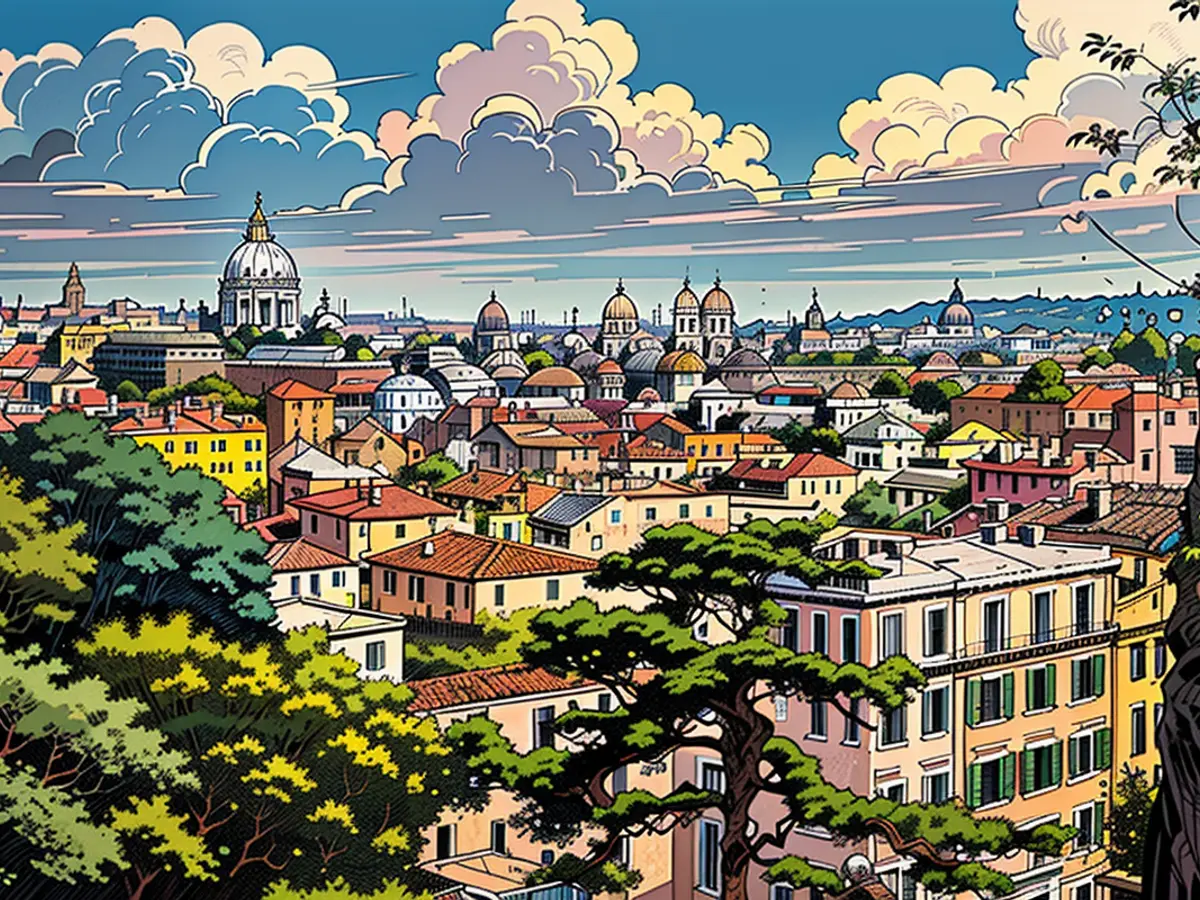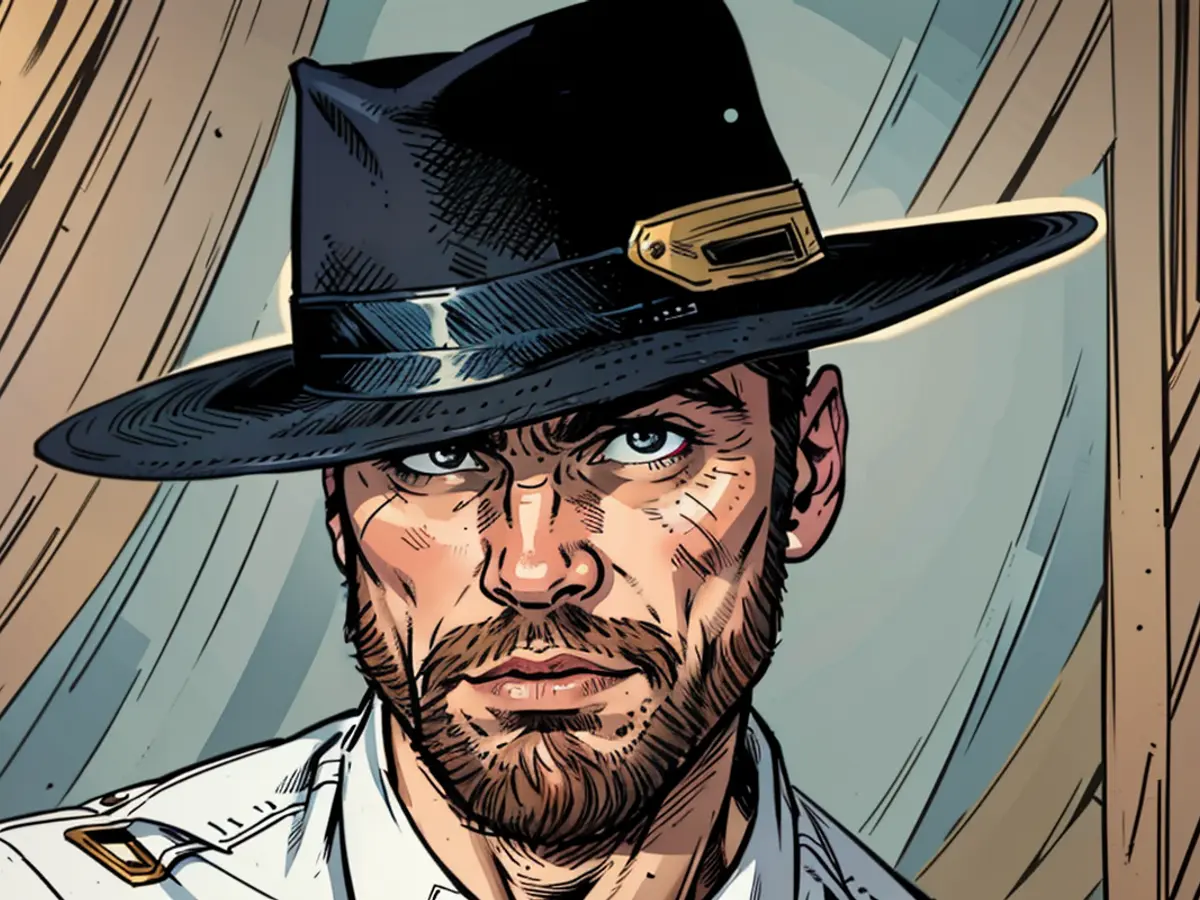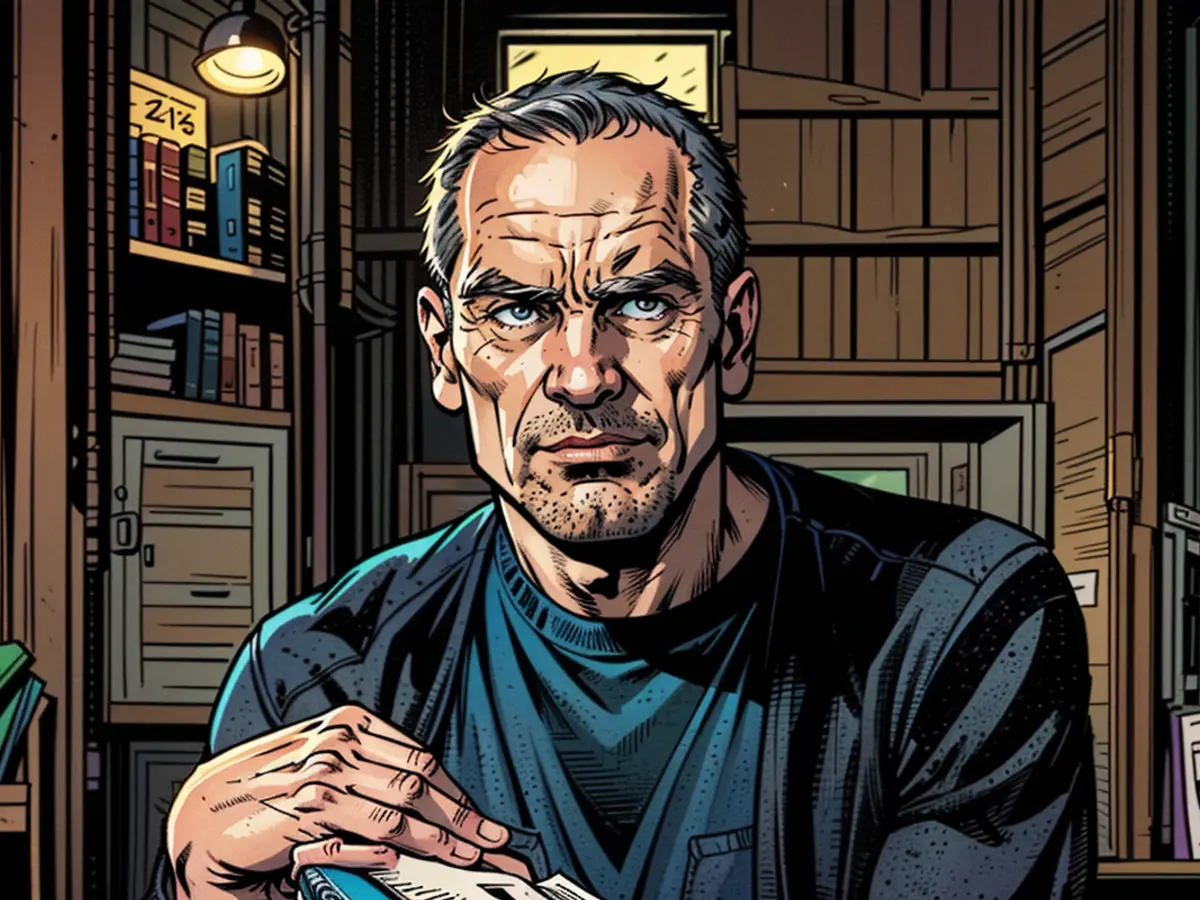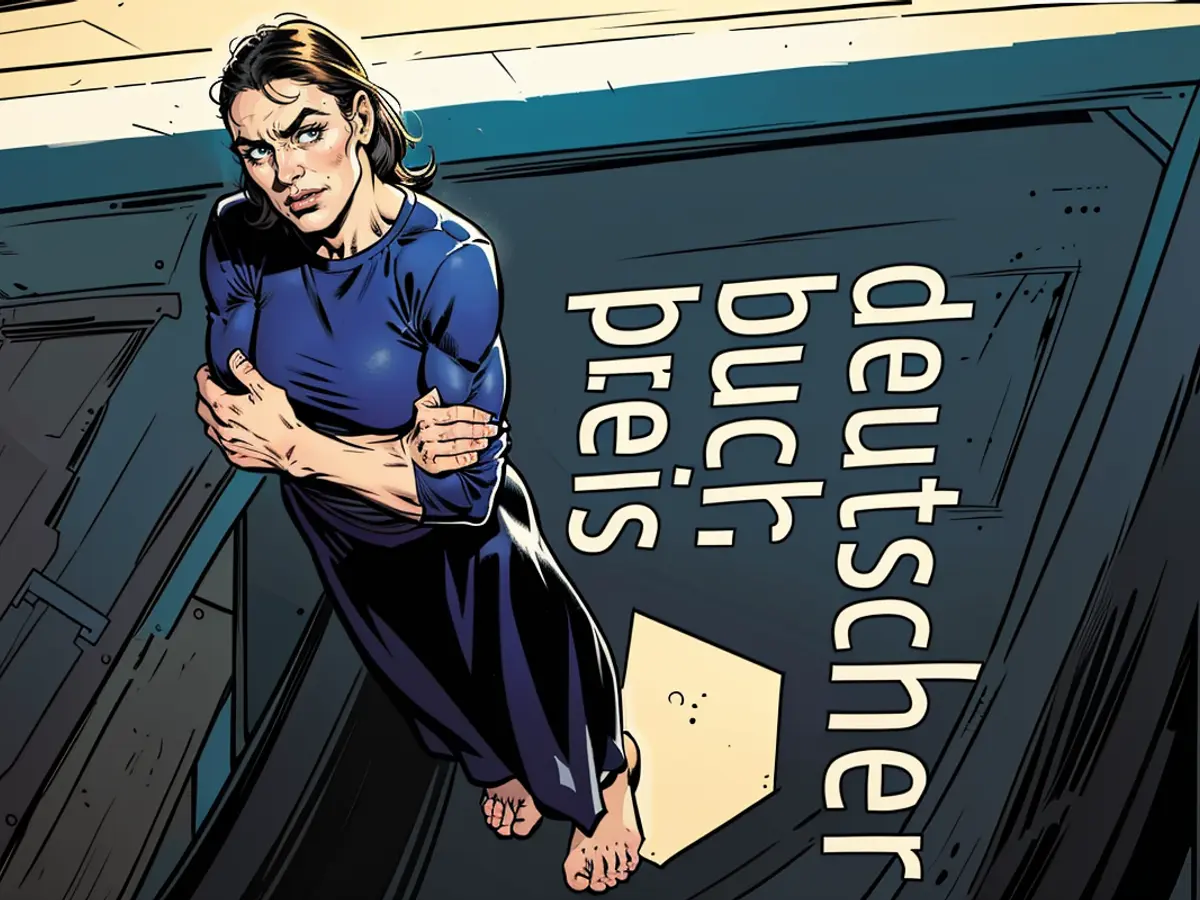Italy's Book Fair holds numerous tales to share
Italy is the Spotlight at this Year's Frankfurt Book Fair. Typically, many titles from the guest country are published in German. Among the five chosen novels this year, each has a distinctive flavor. They portray the lavish Baroque Rome of the Popes, tell the tale of a 13-year-old murderer who turns to writing, and delve into the life of a mafia hunter who obtains literary recognition.
The Neglected Baroque Artisan
The novel "The Architect's Villa" by Melania G. Mazzucco immerses us in late 17th-century Rome, shedding light on an overlooked figure: Plautilla Bricci, the first female architect of the Baroque period. She designed the "Villa Benedetta" for Abbot Benedetti on the Gianicolo hill. The structure was remarkable: It resembled a ship stranded on a rock, its bow defiantly facing the St. Peter's Dome and the Pope's palace.
Mazzucco stumbled upon the occupation title "architettrice" in 2002 during her research, a feminine form of architect that doesn't exist in Italian. Plautilla had invented it for herself. Over the years, Mazzucco uncovered more details about the intriguing artist's life and work, born in 1616 as the daughter of a painter and a playwright in poverty. Rome was flourishing at that time, driven by the power of popes and cardinals, while intrigue and corruption thrived. Men held the power, women were invisible, often dying in childbirth, and children often didn't survive long.
Plautilla defied the odds: At 13, she painted her first altar piece, later becoming an honorary member of the Accademia di San Luca and running her own workshop. Mazzucco's novel (translated by Karin Fleischanderl) has become a lively, vibrant, and opulent work of art: Masterfully, she weaves the artist's life into a large, intricate family tapestry, painting a picture of a Rome that was decadent and marred by poverty. Sadly, the villa designed by Plautilla no longer exists, having been destroyed by cannons during the French siege in 1849. But somewhere on the Gianicolo, a foundation stone with a lead plate bearing Plautilla Bricci's name - and the title "architettrice" - still lies buried in the earth.
The Elusive One Who Doesn't Want to Be Found
Maddalena Vaglio Tanet was celebrated in Italy and was a Premio Strega nominee for her debut work. She narrates the story of a teacher who one morning fails to attend school but instead disappears into the forest, entitled "Into the Woods" (translated by Annette Kopetzki). The story is based on a true incident: A relative was reported missing in the 1970s after the suicide of her favorite student and reappeared days later, malnourished and disoriented. The real-life details of her disappearance remain unknown. Tanet spins a novel around this core event, filling in the gaps with fiction and evocatively portraying emotions of pain, shame, and guilt.
She leads Silvia, the teacher, deeper and deeper into the woods until she eventually finds a dilapidated cabin: "The teacher entered, swaying, her senses bewildered. Upon crossing the threshold, she collapsed to the ground and did not stir."
Suppressed emotions resurface, Silvia recalls her experiences as a boarding school student under the supervision of nuns, World War II-era incidents, and is haunted by visions of a deceased student. Whilst family and neighbors in Biella, a Piedmontese town, anxiously search for the missing person, a boy stumbling upon the woods eventually discovers her. However, Silvia does not wish to be found - her role and that of the student exchange places.
"...because I took a life"
Another notable debut novel was made available in German this summer: "This Sea, This Immoveable Sea" by Francesca Maria Benvenuto. Christine Ammann provides the translation, which requires some getting used to but once familiarized, the story flows smoothly: A 15-year-old named Zeno is incarcerated on the island prison of Nisida and has promised his Italian teacher to record his thoughts. In exchange, the professor will attempt to secure him permission to spend Christmas with his mother.
Zeno now writes freely, lacking in grammatical finesse at times. "I'm in the juvenile detention center on Nisida because I took a life - shot him, to be precise." Originally from Forcella, a Neapolitan quarter ruled by the Camorra, Zeno was drawn into criminal activities at a young age and became a drug dealer. His father is imprisoned, and his mother works in the sex industry. But instead of sharing a small, cramped room with his beloved mother, he now stares at the sea, which, he claims, "is completely useless." "We're not even allowed to swim in that worthless sea, because we fear that we'll escape. (...) I've never even dared to swim beyond where I can touch bottom. (...) I only swim with an inflatable mattress, and with arms and legs for swimming." One advantage to prison: "There are enough windows for everyone."
Welcome to the tale of Luca, born in Naples, now functioning as a legal defender in Paris. This individual has penned an exceptionally private piece of literature. He showcases a 16-year-old offender, switching between an unsettlingly casual cruelty and a heartfelt innocence, as he narrates his experiences in Forcella and Nisida. As a result, he indirectly critiques the entire barbaric nature of the criminal underworld's organized structure.
A Monument to Italy's Mafia Fighter
Roberto Saviano has repeatedly focused on the plight of youngsters in Naples, who had not yet reached adulthood yet were ensnared by the Camorra, transforming into criminals. In his latest novel, he delves into Italy's organized crime scene once more, but with a fresh perspective. Through "Eagle," Saviano pays a literary homage to Giovanni Falcone, the Italian judge and mafia hunter who was fatally targeted by a bomb blast on May 23, 1992, near Palermo.
Saviano's narrative seamlessly weaves in Falcone's life story, illuminating the people who commit their lives to dismantling the mafia, fully conscious of the mortal peril they face daily. "Eagle" (brought to life by the remarkable translation talents of Annette Kopetzki) showcases Falcone as not just a brilliant jurist, but also a devoted husband, brother, and friend. Despite its gripping narrative, it also sheds light on the working conditions of Italy's investigators: how they follow clues, rejoice in victories (such as the historic maxi-trials of the 1980s), and grapple with setbacks. They also deal with obstacles like bureaucratic squabbles and suspicious connections ascending to the highest political echelons. Despite the staggering frustration, Falcone never wavered in his dream: a mafia-free world.
Saviano's Anti-Mafia Crusade
Since the release of his groundbreaking "Gomorrah" in 2006, Saviano has proactively fought against the mafia, necessitating police protection. He is a sharp critic of the Italian government headed by post-fascist Giorgia Meloni. A TV program featuring him was taken off the air last year on the state-owned Rai. The controversy surrounding his non-inclusion in the official delegation for the book fair last year prompted a smattering of protest letters from writers, some of whom later withdrew their support. Saviano eventually journeyed to Frankfurt at the invitation of his German publisher Hanser.
During a PEN gathering at the book fair, influential Italian authors were vocal regarding the handling of free speech by the Meloni government. "Political power silences voices it doesn't want to hear," said Francesca Melandri, for instance. Antonio Scurati, who wrote a comprehensive biography of Mussolini and was denied broadcast permission to deliver a speech on Italian Liberation Day, noted: "I was treated like an adversary, like a stray dog." He was "subjected to personal attacks, defamation, and censorship." The event's motto, "Roots in the Future," Scurati interprets critically: According to him, the Italian organizers are allegorically referencing the roots of (neo-)fascism.
The Radicalization of Neo-Fascism
Davide Coppo tackles this very neo-fascism in his captivating novel "The Dawn Belongs to Us" (translated by Jan Schönherr). Coppo follows his protagonist Ettore's transformation in the early 2000s as he becomes entangled in a fascist youth organization in Milan and chronicles his gradual radicalization. Initially, it's a charismatic fellow student and the consumption of questionable online content that lures the shy boy in.
After an altercation nearly escalates with a member of a left-wing collective, Ettore experiences a surge of euphoria: "That's precisely the sensation I cherish. It defines me. I was happy where I belonged, visible and validated. I was hated, and that hatred affirmed me." He becomes increasingly enamored of violent impulses - eventually embracing a criminal lifestyle himself.
Coppo elaborates in his afterword: "Everything in this book is a work of fiction, but it casts a grim shadow over a past reality." In various interviews, he admits to exploring neo-fascist ideology for a time during his teen years. "I sought to understand how my life might have unfolded if I hadn't changed course," he revealed to "Sputnik". The ensuing piece is a chilling exploration that transcends the boundaries of Italy with its haunting message.
The European Union has expressed its concern over the recent political developments in Italy, with some leaders questioning the country's commitment to upholding democratic values and protecting free speech. This is particularly relevant in the context of the Frankfurt Book Fair, where Italian author Roberto Saviano was initially not invited to the official delegation and faced censorship in his own country.
The European Union has also recognized the significant contributions of Italian authors to international literature, such as Francesca Maria Benvenuto and her debut novel "This Sea, This Immoveable Sea." These works offer insightful perspectives on social issues in Italy, including the impact of organized crime and the challenges faced by young people in vulnerable situations.








